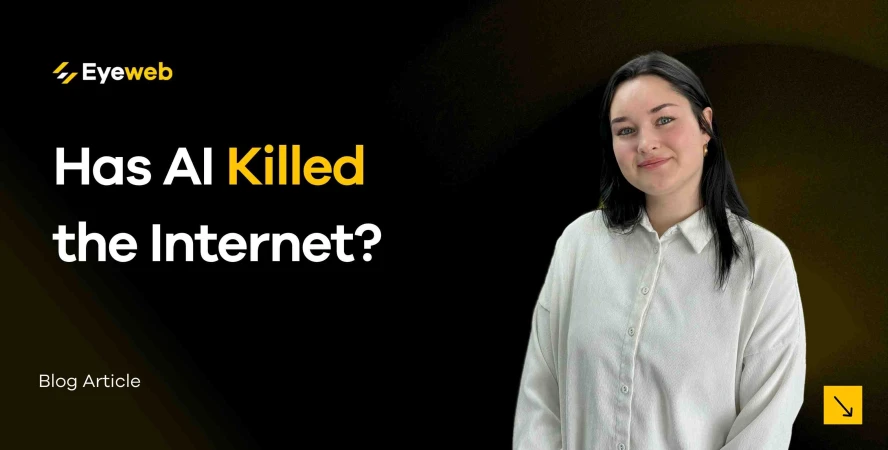As an enjoyer of social media, I often become buried in my Facebook timeline after opening the app to check a single notification. Recently, something has been interrupting my peaceful scrolls.
There's been an influx of uncanny photos, including everything from 120-year-old grandmas making Great British Bake Off-level cakes to Jesus-shrimp hybrids. What’s more, all of these pictures have thousands of likes and comments, with sincere messages like “Happy Birthday!” and “Amen!”.
To the untrained eye, these posts might seem like miracles. To the familiar, these stand out instantly as images generated by artificial intelligence (AI).
In comes the “Dead Internet Theory”, the scary idea that most of the internet, including social media, is no longer run by humans. Instead, the majority of the content is created and engaged with by bots and AI.
But I’m real...and you’re real, so is there any truth to the Dead Internet Theory? And more importantly, what does this mean for real businesses that are trying to build a presence online?

When did the idea of a “dead” internet begin?
The Dead Internet Theory started to gain traction around 2021, even before the mainstream AI use seen with ChatGPT. Internet users were already seeing a decline in original, human-based content due to heavy curation by social media algorithms. Posters would be rewarded with likes and engagement for copy-pasting viral images, videos and ideas like robots.
With 2022 came the boom of DALL·E and Midjourney, putting the capability to generate completely fake, realistic images into the public’s hands. This major influx created an online epidemic, with both real people and bots using this so-called “AI slop” to farm engagement for their accounts. As such, the Dead Internet Theory, while still a theory, started to feel a tad too real for internet users.
While this might all sound a bit extreme, it’s not entirely outlandish. We already know that bots make up a significant percentage of internet traffic. In 2024, a report by Imperva revealed that almost 50% of online activity comes from non-human sources, including search engine crawlers, spam bots and automated scripts. The question is - has this ‘killed’ the internet?
Should I be using AI as a business owner?
For businesses looking to boost their digital marketing, content creation and branding, the rise of AI-generated content presents both opportunities and challenges. While AI can be a useful tool, relying too heavily on it leads to a soulless and unoriginal online experience.
1. Lackluster writing
AI-generated content can mimic human writing but lacks originality, emotion and lived experience. Blog posts churned out by algorithms might hit the right keywords, but they rarely have the depth or personality that connects with real readers. In marketing, human connection cannot be understated, and people respond to authenticity.
2. The search engine optimisation (SEO) problem
Search engines like Google prioritise high-quality, valuable content. While AI can generate an article quickly, much of it is rehashed, generic and lacks insight. Google has already taken steps to identify and devalue AI-generated content that doesn’t offer real expertise or experience. Businesses that flood their sites with mass-produced AI articles risk losing credibility and rankings.
3. Trust and engagement
If users start feeling that everything online is artificial, trust in digital content could erode. People usually want to engage with real voices, not faceless AI. Brands that prioritise human-driven content, whether through storytelling, unique insights or genuine interaction, will stand out in an increasingly automated space.
Will human-driven content survive?
Despite the rise of AI, people still crave human connection. This is why genuine, high-quality work will - for now - have an important place in the digital world.
Human creativity is unpredictable, emotional and deeply personal, which is something AI currently struggles to replicate. While it can remix existing content, it lacks some of the ability to bring fresh perspectives and truly never-before-seen ideas.
AI isn’t going anywhere, and that’s not a bad thing. When used wisely, it can enhance creativity, streamline workflows and provide valuable insights. But it should support human effort, not replace it.
So, what should I do instead?
The internet isn’t dead. But if we allow AI to dominate every aspect of online communication, it might start feeling that way.
A good digital marketing partner, like Eyeweb, prioritises quality over quantity, embraces originality and knows that behind every screen is a person looking for something to connect with.
If you need help building trust with your customers and attracting new leads with high-quality digital marketing and web design, give us a shout today.




